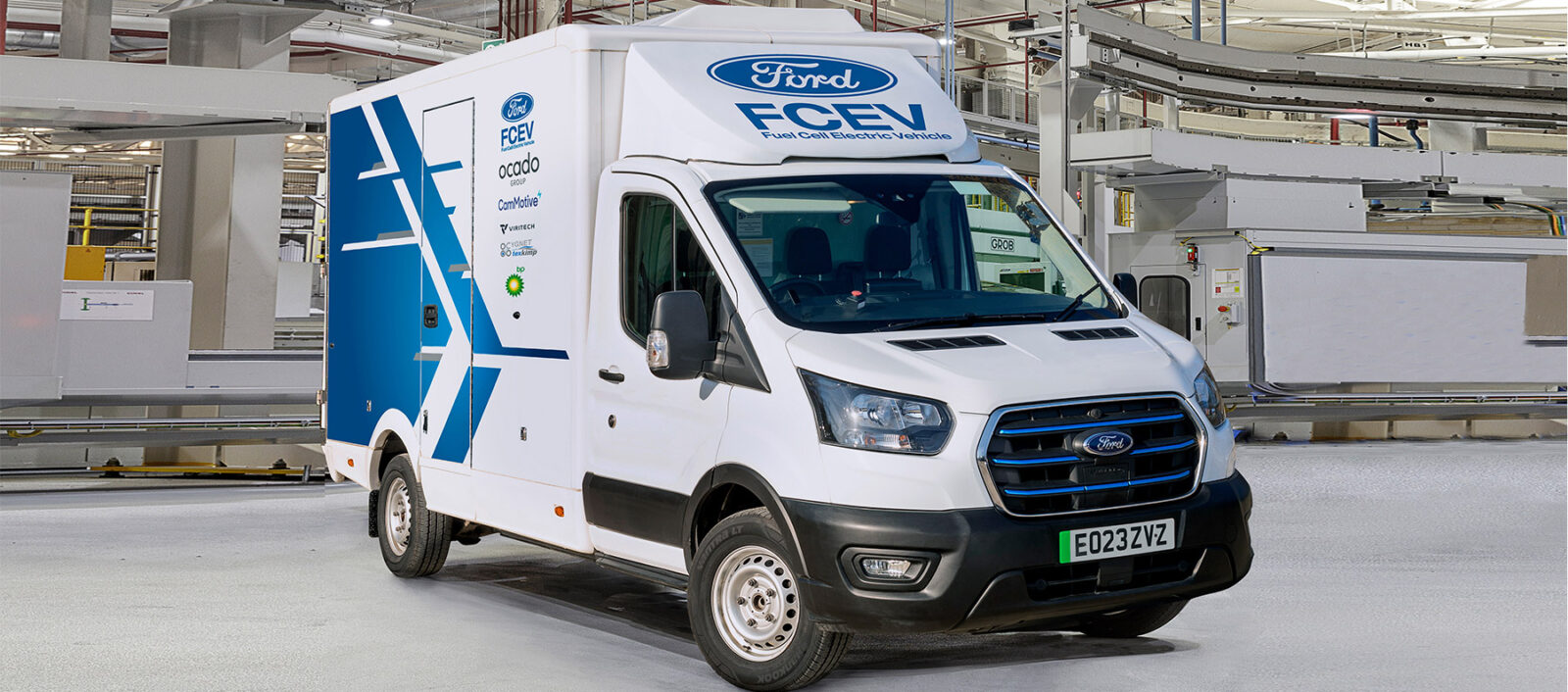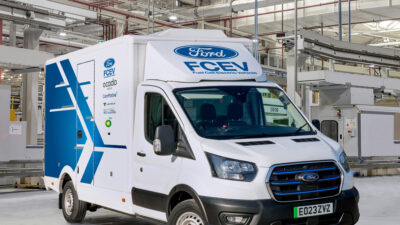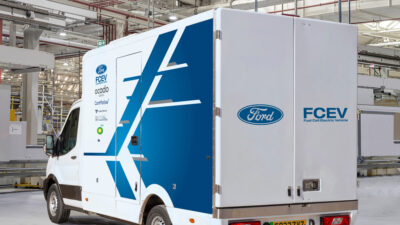- Ford leidt innovatieconsortium dat brandstofceltechnologie test op volledig elektrische Ford E-Transit
- Bedrijfswagenbestuurders profiteren van grotere actieradius van emissievrije voertuigen en sneller tanken
- Kleine prototypevloot in het VK, ontwikkeld door Ford Pro bedrijfswagen-experts, als onderdeel van een breder onderzoeksproject naar alternatieve brandstoffen
Ford doet onderzoek naar het potentieel van waterstof als energiebron voor de veelgeprezen volledig elektrische E-Transit bedrijfswagen. Het onderzoek zal vaststellen of brandstofceltechnologie kan helpen om een groter emissievrij rijbereik te bieden voor E-Transit-klanten met energie-intensieve gebruiksscenario's. Lees verder
Downloads
Gedeeltelijk gefinancierd door het Advanced Propulsion Centre (APC), zal het Ford-consortium van zes leiders op het gebied van autotechnologie en wagenparkbeheer ook helpen bij het bepalen van de vereiste ondersteunende infrastructuur voor het tanken van waterstof. Ford Pro zal het proefproject gebruiken om zijn conversie-expertise uit te breiden.
Ford verwacht dat de primaire toepassing van brandstofceltechnologie tot zijn recht zal komen in de grootste, zwaarste bedrijfswagen varianten. Zo kunnen deze voertuigen met een hogere energiebehoefte ook emissievrij zijn en tegelijkertijd het rijbereik leveren dat klanten eisen.
Lees hieronder het volledige bericht in het Engels:
Integrating zero-carbon auto tech
Ford’s hydrogen fuel cell E-Transit project with the APC will validate the vehicle’s business case by linking Ford expertise as 57-year UK van market leader with fuel cell powertrain experts and fleet operators including Ocado Retail. Other partners on the project are bp, capturing hydrogen usage and infrastructure requirements; Cambustion, testing the fuel cell system; Viritech, designing hydrogen storage systems; and Cygnet Texkimp, providing the pressure vessels’ carbon fibre tooling.
Hydrogen fuel cells produce electricity by combining hydrogen from an onboard tank and oxygen, with the only resulting emissions being water. The system essentially uses the hydrogen tank as a “gas battery” to improve range and deliver faster charging than the solid batteries and mains-connected chargers typically used by EVs. This may benefit operators with heavy-duty use cases including long-distance transportation, maximum loads, ancillary equipment such as chillers, and those with limited charging opportunities in the working shift.
Ford has researched fuel cell technology since the 1990s, developing many prototypes, refining test fleet vehicles in partnership with customers, and in 2021 demonstrated an E-Transit fuel cell vehicle at the CENEX Low Carbon Vehicle Show. At a European level, Ford is still involved in a number of publicly-funded projects that are also exploring the use of hydrogen technologies, both for use with internal combustion engine-powered vehicles and fuel cells.
A test fleet of eight hydrogen fuel cell Ford E-Transits will run for six-month periods over the three-year project to 2025. The test fleet data will provide insights into the total cost of owning and operating a large van with enhanced zero-emission range and uptime that matches a diesel-powered equivalent.
The prototype Ford E-Transits will be fitted with a high-power fuel cell stack, in conjunction with significant hydrogen storage capability, optimised for safety, capacity, cost, and weight. An important project element will evaluate efficient and viable recycling for end-of-life components.
Road to better
The hydrogen E-Transit project supports Ford’s ‘Road to Better’ sustainability commitment, evidencing how the company’s European operations are set to be its first region to become carbon neutral by 2035. Ford has reduced emissions from its global manufacturing facilities by 40 per cent since 2017.




